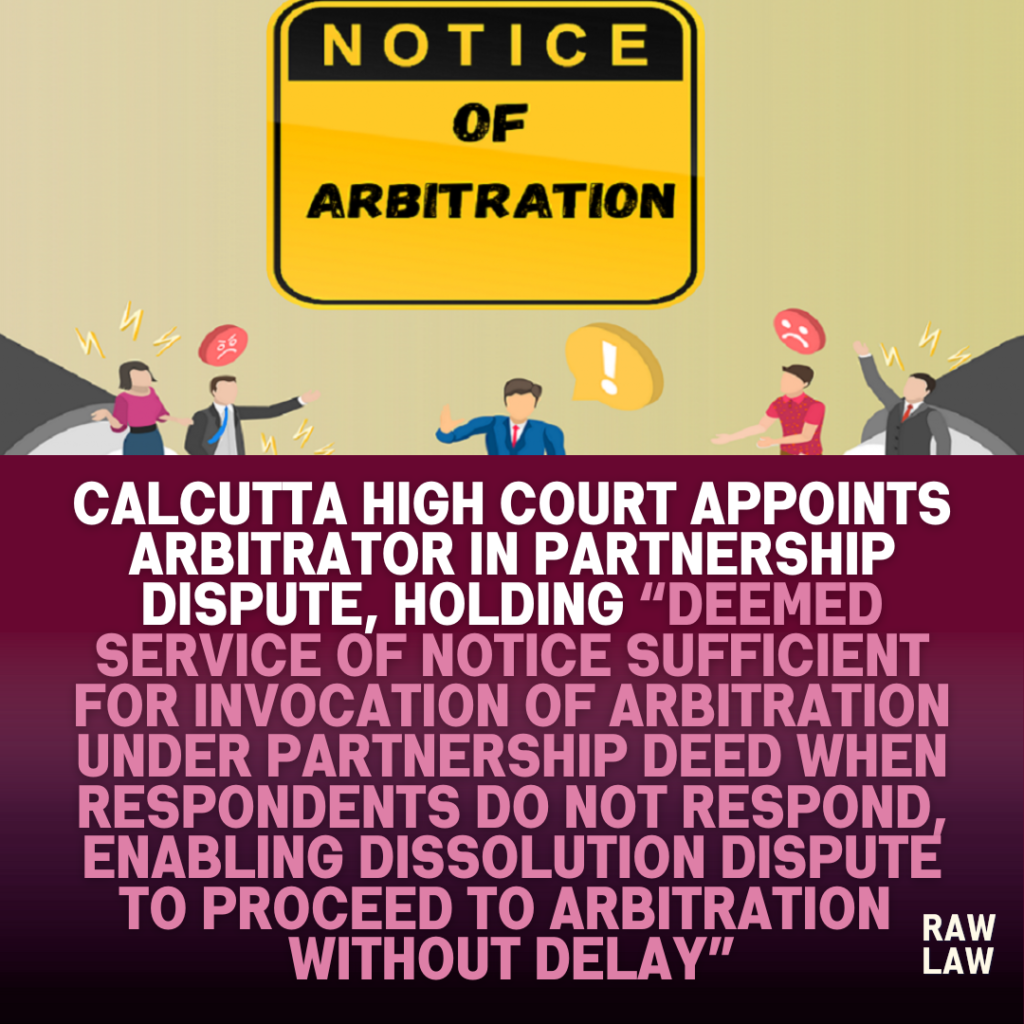Court’s Decision
The Calcutta High Court allowed the petition under Section 11 of the Arbitration and Conciliation Act, 1996, appointing Ms. Urmila Chakraborty as the sole arbitrator to resolve disputes arising from a partnership deed, including issues of dissolution, accounts, and non-sharing of profits, holding that deemed service under Section 3(1)(b) was sufficient to invoke arbitration as the respondents failed to respond to the arbitration notice.
Facts
The petitioner, under a partnership deed dated 21 September 2019 containing an arbitration clause (Clause 19), sought dissolution of the partnership and settlement of accounts, alleging non-sharing of profits and non-disclosure of accounts. The petitioner issued a notice invoking arbitration on 13 March 2025. Respondent No. 2 received the notice, but the postal article to Respondent No. 1 was returned ‘unclaimed’ despite intimation. An earlier application under Section 11 was withdrawn on technical grounds with liberty to refile. The petitioner filed the present application seeking appointment of an arbitrator.
Issues
- Whether deemed service of the arbitration notice under Section 3(1)(b) of the Arbitration Act and the General Clauses Act was sufficient to proceed with the appointment of an arbitrator.
- Whether the non-response of the respondents entitled the petitioner to appointment of a sole arbitrator for disputes under the partnership deed, including dissolution and accounts.
Petitioner’s Arguments
The petitioner argued that a valid arbitration agreement existed under Clause 19 of the partnership deed, and having issued the notice invoking arbitration, was entitled to appointment of an arbitrator as the respondents failed to respond, thus fulfilling the conditions under Section 11. It was contended that the notice was duly served on Respondent No. 2 and deemed served on Respondent No. 1 under Section 3(1)(b) of the Arbitration Act and Section 27 of the General Clauses Act read with the presumption under Section 114 of the Evidence Act, entitling the petitioner to proceed.
Respondent’s Arguments
The respondents did not appear despite service and did not respond to the arbitration notice. The record showed Respondent No. 2 was served while Respondent No. 1 did not claim the postal article despite intimation.
Analysis of the Law
The Court analyzed Section 3(1)(b) of the Arbitration and Conciliation Act, which provides that a notice is deemed to have been received if sent to the addressee’s place of business and returned unclaimed. Coupled with Section 27 of the General Clauses Act and the presumption under Section 114 of the Evidence Act, deemed service was established.
The Court noted that under Clause 19 of the partnership deed, disputes relating to dissolution, accounts, and other matters between partners must be referred to arbitration, and as the respondents failed to respond to the invocation, the petitioner was entitled to seek appointment of an arbitrator.
Precedent Analysis
While the judgment did not cite specific precedents, it applied:
- The statutory framework under Section 11 of the Arbitration Act on the appointment of arbitrators.
- Interpretation of Section 3(1)(b) of the Arbitration Act on deemed service, consistent with settled law.
- Application of the presumption under Section 114 of the Evidence Act to support the deemed service principle.
Court’s Reasoning
The Court held:
- The arbitration clause in the partnership deed covered disputes regarding dissolution and accounts.
- The respondents’ failure to respond to the arbitration notice gave the petitioner the right to seek an arbitrator’s appointment under Section 11.
- Deemed service on Respondent No. 1 was established under statutory presumptions, enabling the matter to proceed ex parte.
- The dispute was alive, and the issues of limitation, merits, and contentions would be decided by the arbitrator, with the court not expressing any opinion on merits at this stage.
Conclusion
The Calcutta High Court appointed Ms. Urmila Chakraborty as the sole arbitrator to adjudicate the disputes arising under the partnership deed, including dissolution and accounting issues, with the appointment subject to compliance with Section 12 of the Arbitration Act, and directed the arbitrator to fix her remuneration as per the Act. The application was disposed of accordingly.
Implications
This judgment underscores that:
- Deemed service principles under the Arbitration Act can facilitate the invocation of arbitration despite respondents avoiding service.
- Partnership disputes relating to dissolution and accounts can proceed to arbitration without obstruction if respondents do not respond.
- Courts will not examine the merits of disputes at the Section 11 stage, preserving the arbitrator’s domain.
Short notes on the laws referred and applied
- Section 3(1)(b) Arbitration Act: Deemed service if notice sent and returned unclaimed.
- Section 27 General Clauses Act: Service deemed effected under statutory provisions.
- Section 114 Evidence Act: Presumption of due service when unclaimed after intimation.
These were applied to validate service on Respondent No. 1 and allow arbitration invocation.
FAQs
1. Can arbitration be invoked if a partner refuses to accept notice?
Yes, under Section 3(1)(b) of the Arbitration Act, notice returned unclaimed is deemed served, allowing arbitration to proceed.
2. What disputes can be referred to arbitration under a partnership deed?
Disputes on dissolution, accounting, profit-sharing, and related partnership rights can be referred to arbitration if an arbitration clause exists.
3. Does the court examine merits in a Section 11 arbitration appointment?
No, the court only examines the existence of an arbitration agreement and live disputes; merits are decided by the arbitrator.



